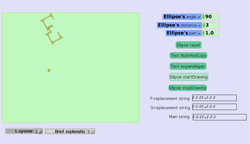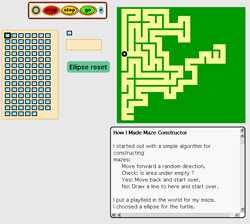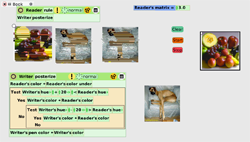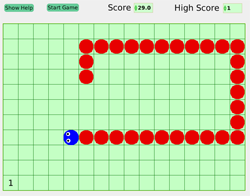Etoy Project sampler: Difference between revisions
Jump to navigation
Jump to search
Karlramberg (talk | contribs) No edit summary |
Karlramberg (talk | contribs) No edit summary |
||
| (45 intermediate revisions by 2 users not shown) | |||
| Line 1: | Line 1: | ||
| ⚫ | |||
| ⚫ | |||
| ⚫ | |||
Made by Karl Ramberg and packaged by Bert Freudenberg |
|||
==JournaMorph== |
|||
<table><td>[[media:JournalMorph.005.pr ]] |
|||
:A Etoy scriptable interface to the XO Journal.</td></table> |
|||
==Lindenmayer system== |
==Lindenmayer system== |
||
[[media:Lsystem3-8.xo]] |
<table><td>[[media:Lsystem3-8.xo]] |
||
[[media:New_draw_system.016.pr]] |
|||
:Quote from wikipedia: http://en.wikipedia.org/wiki/L-system :An L-system or Lindenmayer system is a parallel rewriting system, namely a variant of a formal grammar (a set of rules and symbols), most famously used to model the growth processes of plant development, but also able to model the morphology of a variety of organisms.[1] L-systems can also be used to generate self-similar fractals such as iterated function systems. L-systems were introduced and developed in 1968 by the Hungarian theoretical biologist and botanist from the University of Utrecht, Aristid Lindenmayer (1925–1989). |
:Quote from wikipedia: http://en.wikipedia.org/wiki/L-system :An L-system or Lindenmayer system is a parallel rewriting system, namely a variant of a formal grammar (a set of rules and symbols), most famously used to model the growth processes of plant development, but also able to model the morphology of a variety of organisms.[1] L-systems can also be used to generate self-similar fractals such as iterated function systems. L-systems were introduced and developed in 1968 by the Hungarian theoretical biologist and botanist from the University of Utrecht, Aristid Lindenmayer (1925–1989). |
||
Made by Karl Ramberg</td><td>[[image:Lsystem.png]]</td></table> |
|||
==Maze constructor== |
==Maze constructor== |
||
[[media:Mazeconstructor- |
<table width=100%><td>[[media:Mazeconstructor-16.xo]] |
||
:A simple maze algorithm with a backtracking system. |
:A simple maze algorithm with a backtracking system. Includes a tutorial describing the implementation. |
||
Made by Karl Ramberg</td><td>[[image:Maze.png]]</td></table> |
|||
==Picture filtering== |
==Picture filtering== |
||
<table><td>[[media:ColorReadingAndWriting-17.xo]] |
|||
:blablablablabla |
|||
: A project copying pictures with a turtle, and do various color changes and filtering to the colors in the process. It is quite easy to experiment with things like mosaic and black and white color changes. |
|||
Made by Karl Ramberg</td><td>[[image:ColorWrite.png]]</td></table> |
|||
==Snake game== |
==Snake game== |
||
<table><td>[[media:Snake-19.xo]] |
|||
:blablablablabla |
|||
: Steer the snake and collect numbers. The more numbers you collect, the longer the snake gets and it becomes harder and harder not to crash into the snake body or the sides. |
|||
Made by Karl Ramberg</td><td>[[image:Snake.png]]</td></table> |
|||
<table><td>[[media:NewEtoys4.xo]]</td></table> |
|||
| ⚫ | |||
| ⚫ | |||
| ⚫ | |||
Latest revision as of 22:21, 11 January 2010
Camera play
- A simple demo that track a distinct color with the built in XO camera and moves a object on screen accordingly.
Made by Karl Ramberg and packaged by Bert Freudenberg
JournaMorph
media:JournalMorph.005.pr
|
Lindenmayer system
media:Lsystem3-8.xo
|  |
Maze constructor
media:Mazeconstructor-16.xo
|  |
Picture filtering
media:ColorReadingAndWriting-17.xo
|  |
Snake game
media:Snake-19.xo
|  |
| media:NewEtoys4.xo |